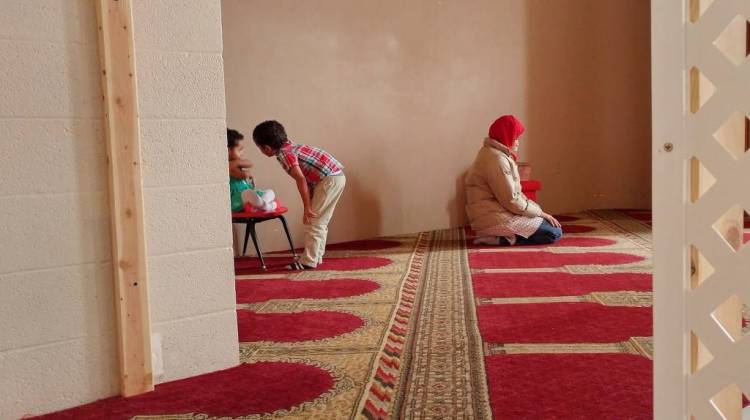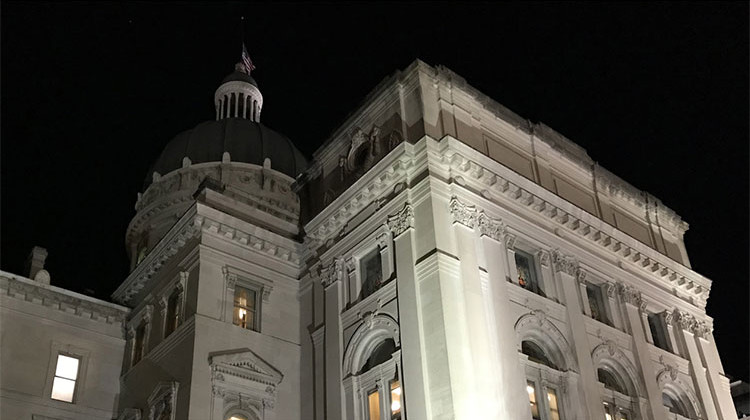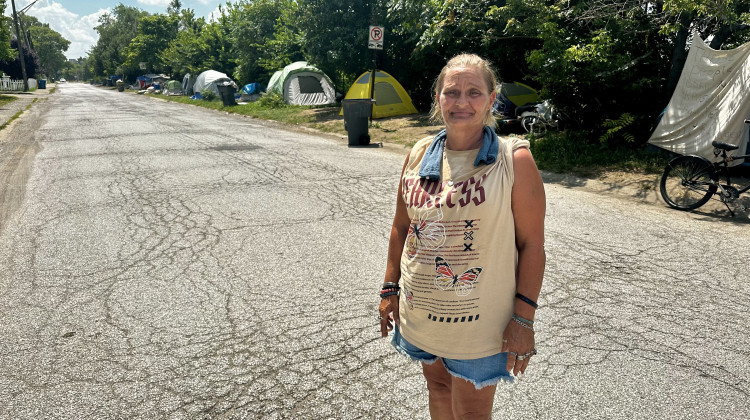
alia Mohamed prays before an interview at the Islamic Society of Columbus, Indiana, while her kids, 2-year-old Selma and 5-year-old Mohamed, play nearby.
Annie Ropeik/IPB NewsA panel of judges will decide whether to reinstate President Donald Trump’s executive order on refugees and immigration after a hearing on Feb. 8. On Feb. 3, a federal judge halted the travel restrictions to seven countries.
Whatever happens, the order is likely to head to the U.S. Supreme Court – but in the meantime, Indiana towns with large immigrant populations are already grappling with its impacts.
Dalia Mohamed and her family attend the Islamic Center of Columbus, the only mosque in the hometown of Vice President Mike Pence – population 45,000.
Mohamed stops to pray before being interviewed, then introduces her two kids: Mohamed, 5, and Selma, 2. The family are all U.S. citizens – the kids by birth, the parents by naturalization.
Mohamed and her husband came to Columbus from Sudan, one of the seven countries covered by the executive order, years ago.
“I didn’t visit a big city yet, so I think this is nice. It’s comfortable for me, it’s like home for me,” Mohamed says. “Actually, Mohamed thinks this is his home.”
Mohamed’s husband is one of thousands of foreign-born employees at Cummins Diesel. Since he’s a citizen, he wasn’t directly affected by the executive order. But he and Mohamed still have lots of Sudanese family overseas who now can’t come to the U.S. to visit or get medical care as planned.
Cummins has about 60 workers who are not citizens, and are from the countries named in the order – people on visas or green cards. The company is actually one of the top per-capita users of those skilled worker visas in the country, with 1,400 visa workers out of its 8,500 Columbus employees. So Cummins and others in this community are watching the situation closely.
At the nearby Presbyterian church, pastor Felipe Martinez has broken out a banner he usually reserves for the holidays. It reads, “immigrants and refugees welcome.”
Martinez himself was born in Mexico and became a U.S. citizen in 2007. He says the President’s order sends the wrong message to immigrants.
“The richness of culture that they share, the ability for us to have a worldview, the ability for us to recognize the giftedness that they bring – it’s just an incredible asset for the community,” he says.
Last Friday, Feb. 3, he and nearly 300 other residents joined a packed community forum on the issue, organized by the Islamic Center in an Indiana University-Purdue University Columbus lecture hall.
Indianapolis-based immigration attorney Sarah Barrow spent more than an hour behind a podium answering questions about the ban and what might happen next. Then, someone raised their hand to ask if she’d heard the news: a federal judge in Washington State had put a temporary halt on the ban nationwide.
“While I’m talking?!” she said, earning a laugh and some applause from the audience. “OK… let’s celebrate? I haven’t read it, so I’m not quite sure how to address it. But that would be huge cause for celebration.”
After a pause, the crowd began to clap. But there were still many questions unanswered. Even American citizens like Mohamed remain wary. She says she read the executive order as a signal that she is vulnerable.
“We all feel affected with it. It’s not Sudan, or Yemen – this is about Islam,” Mohamed says. “This is nothing else but Islam.”
But she doesn’t think that’s reflective of the community where she lives. Mohamed says she’s never felt discriminated against in Columbus. It’s still where she wants to raise her family.
“I will never say, OK, I don’t want to be American anymore. No, I’m American,” she says. “I’m Sudanese first and American second, but I will fight for my right. I will never give up, no.”
Still, she says she won’t go back to Sudan or try to bring her family here until the future of the immigration order is settled.
 DONATE
DONATE







 Support WFYI. We can't do it without you.
Support WFYI. We can't do it without you.